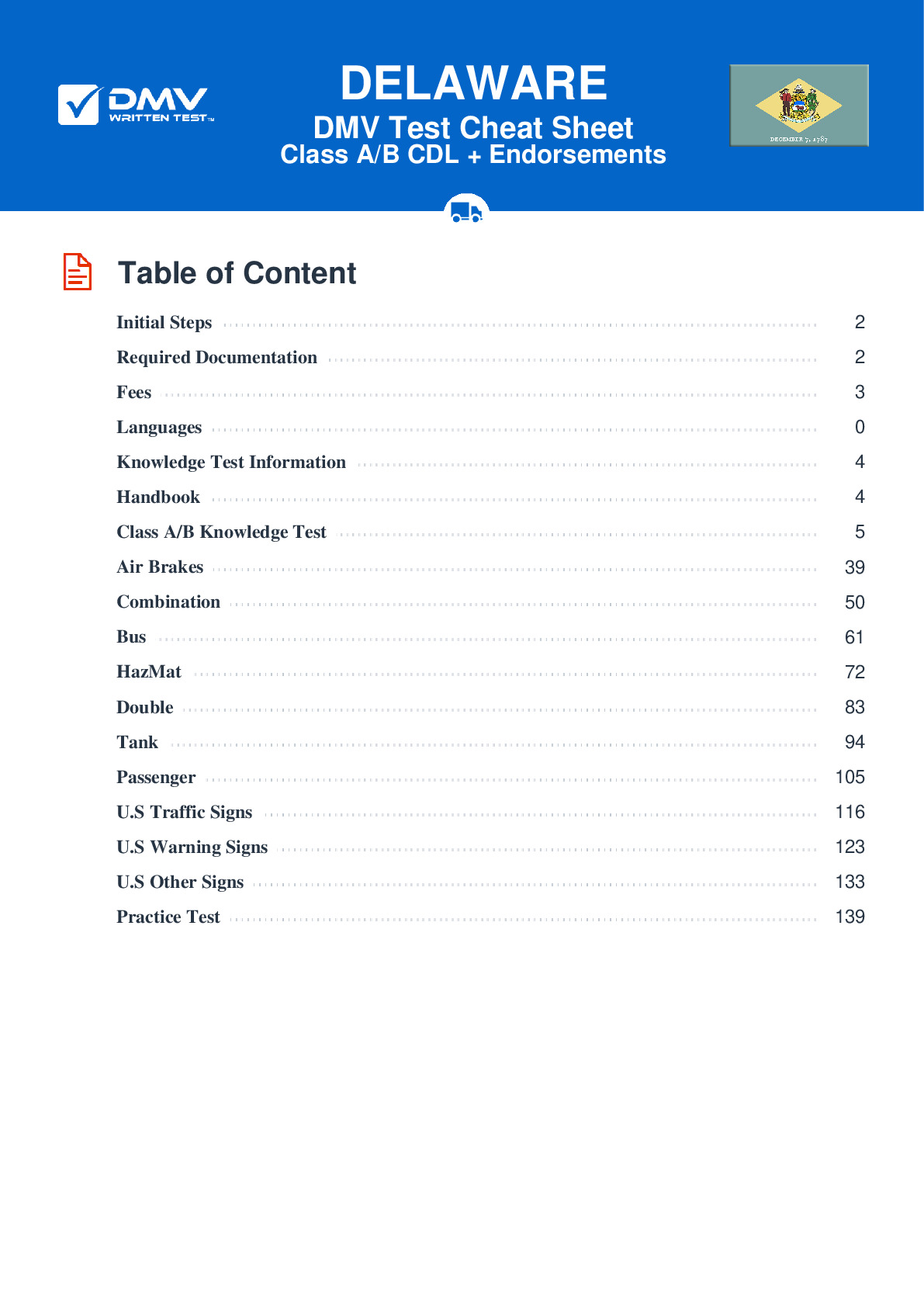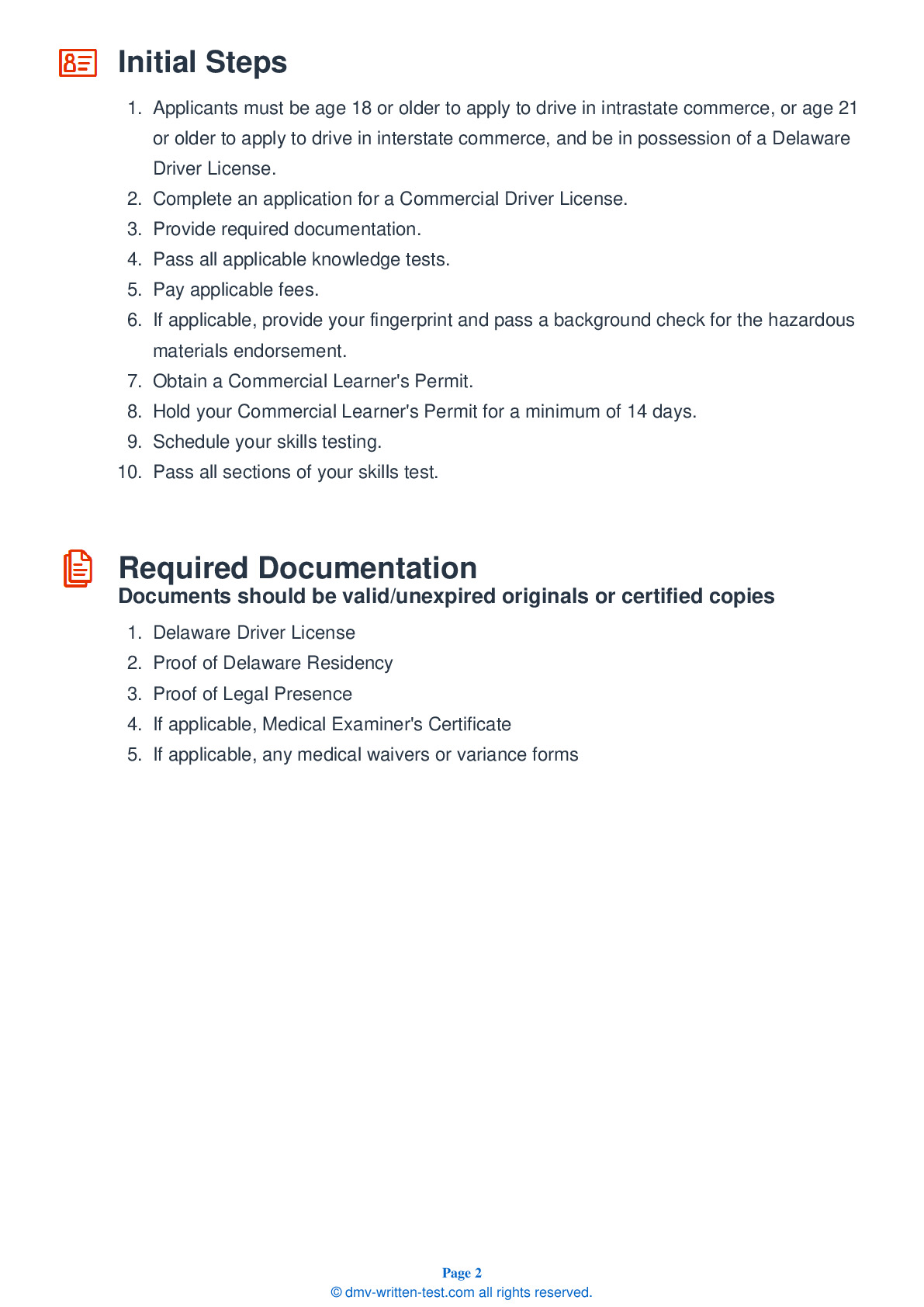Knowledge Test Class A
This license is required for driving any legal combination of vehicles, with a gross combination weight rating of 26,001 pounds or more, provided the GVWR of a trailer exceeds 10,000 pounds To receive this license, applicants must pass a 50-question test. To pass, applicants must answer 40 questions correctly. Each question has three or four possible answer choices. Test questions come from the State of Delaware Commercial Driver License Manual. Questions come from chapters covering: Introduction, Driving Safely, Transporting Cargo Safely, Air Brakes (if applicable), Combination, Doubles and Hazardous Materials. Endorsements that may be used with a Class A CDL are: Hazardous materials, Tank, Passenger, HazMat and Tank, Air Brakes and School bus.
15. A cardboard box on the roadway:
Any foreign object on the road is potentially dangerous. For example, something seemingly harmless, such as a cardboard box or paper sack, could contain a hard or heavy object that could do serious damage to a vehicle.
16. Which type of brakes do most heavy-duty vehicles have?
For safety, most heavy-duty vehicles are equipped with dual air brake systems.
17. On trucks and buses, where are ABS malfunction lamps located?
Tractors, trucks, and buses with Anti-Lock Braking Systems (ABS) have yellow malfunction lamps located on their instrument panels. Trailers have yellow ABS malfunction lamps on their left side, either on the front or rear corner.
18. If a traffic light has been green for a long time:
If you are approaching a traffic light that has been green for a long time, there is a good chance that it will turn yellow before you reach it. Start slowing down and be ready to stop.
19. Failing to drain air tanks could result in:
In an air brake system, the air tanks must be periodically drained to remove accumulations of water and compressor oil. If water is not removed, it could freeze in cold weather and cause brake failure.
20. Which of the following indicates drowsy driving?
Indicators of drowsiness while driving include your eyes closing or going out of focus by themselves, having trouble keeping your head up, and drifting between lanes.
21. If confronted by an aggressive driver, you should:
If confronted by an aggressive driver, the most important thing to do is try to get out of their way. Avoid making eye contact with the driver and do not let yourself be provoked by gestures. Do not try to challenge aggressive drivers by speeding up.
Frequently Asked Questions
1. Obtain a copy of the Delaware Commercial Driver License Manual from the Delaware DMV or download it from their website.
2. Complete a commercial driver's license application at your local DMV office.
3. Provide proof of identity, residency, and social security number.
4. Obtain a medical certificate from an authorized medical examiner listed on the National Registry of Certified Medical Examiners.
5. Pass the written knowledge test for the Class A CDL license.
6. Obtain a learner's permit by passing the vision test and paying any necessary fees.
7. Complete behind-the-wheel training with a CDL instructor or through an approved program.
8. Pass the road skills test demonstrating your ability to safely operate your vehicle.
9. Pay any necessary fees to obtain your Class A CDL license.
Once you have obtained your Class A CDL license in Delaware, you will be required to follow all state and federal regulations related to commercial driving.
1. Tractor-trailers: These are the most common types of combination vehicles and are used to transport goods over long distances.
2. Truck and trailer combinations: These vehicles are used to transport cargo or equipment that requires additional space beyond what a standard trailer can provide.
3. Tanker vehicles: These are vehicles that transport liquids or gases, such as fuel, chemicals, or milk.
4. Livestock carriers: These are vehicles that transport livestock such as cattle, pigs, or sheep.
5. Flatbeds with an attached trailer: This type of combination vehicle is used to transport oversized loads such as heavy machinery or construction equipment.
It's important to note that the specific requirements for operating these vehicles may vary depending on the weight and type of cargo being transported. Additionally, drivers with a Class A CDL license may be required to obtain additional endorsements or certifications for certain types of vehicles or cargo.
1. Age: You must be at least 18 years old to obtain a Class A CDL license. However, you must be at least 21 years old to operate a commercial vehicle across state lines or transport hazardous materials.
2. Valid driver's license: You must have a valid driver's license issued by the state of Delaware.
3. Medical certification: You must obtain a medical certification from an authorized medical examiner listed on the National Registry of Certified Medical Examiners.
4. Knowledge test: You must pass a written knowledge test that covers topics such as safe driving practices, vehicle inspection, and cargo securement.
5. Learner's permit: You must obtain a learner's permit by passing the vision test and paying any necessary fees.
6. Behind-the-wheel training: You must complete behind-the-wheel training with a CDL instructor or through an approved program.
7. Road skills test: You must pass a road skills test demonstrating your ability to safely operate your vehicle.
8. Background check: You must pass a background check, including a criminal history check and driving record review.
9. Fees: You must pay any necessary fees to obtain your Class A CDL license.
It's important to note that additional requirements may apply depending on the type of cargo you plan to transport or if you plan to drive across state lines.
Drivers who are 21 years old or older face no such restrictions and may operate commercial vehicles across state lines. However, it's important to note that certain types of commercial vehicles or cargo may require additional endorsements or certifications, regardless of age.
1. Hazmat endorsement (H): Required to transport hazardous materials.
2. Tanker endorsement (N): Required to transport liquids or gases in bulk containers.
3. Doubles/triples endorsement (T): Required to operate double or triple trailers.
4. Passenger endorsement (P): Required to transport passengers in a commercial vehicle.
5. School bus endorsement (S): Required to operate a school bus.
6. Combination of tank vehicle and hazardous materials endorsement (X): Required to transport both hazardous materials and liquids or gases in bulk containers.
To obtain these endorsements, you must take additional knowledge tests and/or skills tests, and meet other requirements such as background checks and minimum age requirements.
1. Pre-trip inspection: You will be asked to perform a thorough inspection of your vehicle, identifying any potential safety hazards or mechanical problems.
2. Basic control skills: You will be asked to demonstrate your ability to control the vehicle in various situations, such as backing, turning, and parking.
3. On-road driving: You will be required to demonstrate your ability to drive the vehicle safely and efficiently on public roads and highways, while following traffic laws.
During the skills test, you will be evaluated based on a set of specific criteria related to each of these three parts. These may include things like properly adjusting mirrors and seat belts during the pre-trip inspection, maintaining proper speed and lane positioning during on-road driving, and using turn signals and other safety features appropriately.
It's important to note that the skills test must be conducted by a licensed CDL examiner, and that you must pass all three parts in order to obtain your Class A CDL license.
1. Air brake restriction: If you took your skills test in a vehicle without air brakes, your license will be restricted to operating vehicles without air brakes. To remove this restriction, you will need to pass a skills test in a vehicle with air brakes.
2. Manual transmission restriction: If you took your skills test in a vehicle with an automatic transmission, your license will be restricted to operating vehicles with automatic transmissions only. To remove this restriction, you will need to pass a skills test in a vehicle with a manual transmission.
3. Intrastate only restriction: If you do not meet the federal medical requirements for commercial driving, your license may be restricted to operating commercial vehicles within the state of Delaware only.
4. Passenger endorsement restriction: If you obtain a Class A CDL license with a passenger endorsement, you may be restricted to operating commercial vehicles designed to carry 16 or fewer passengers.
It's important to note that these restrictions or limitations may vary depending on individual circumstances, and that they may also be subject to change based on new laws or regulations. It's always best to consult with your state's DMV or other licensing agency for the most up-to-date information on Class A CDL restrictions and limitations.
If you plan to take the written test in a language other than English, you will need to contact your local DMV office or licensing agency to confirm availability and schedule an appointment. It's also a good idea to study the Delaware CDL Manual in your preferred language before taking the test, as this will help you better understand the rules and regulations of commercial driving in Delaware.
Overall, taking the Class A CDL written test in a language other than English can be a helpful option for non-native speakers who are more comfortable reading and writing in their native language. However, it's important to ensure that you are able to communicate effectively in English while driving a commercial vehicle before obtaining your license.
To request accommodations, you will need to complete and submit a Request for Accommodations Form, which is available on the DMV website. The form will ask you to describe your disability and the specific accommodations you are requesting, such as extra time to complete the test or a separate testing room.
You will also need to provide documentation of your disability from a licensed healthcare professional, such as a doctor or psychologist. The documentation should include a clear description of your disability and how it affects your ability to take the written test.
Once your request for accommodations is received, the DMV will review it and determine whether the requested accommodations are reasonable and necessary based on your disability. If your request is approved, you will be notified of the accommodations that will be provided and how to schedule your test.
It's important to note that requests for accommodations may take some time to process, so it's best to submit your request well in advance of your scheduled test date. Additionally, if you have any questions or concerns about the accommodations process, you can contact the Delaware DMV directly for assistance.
In Delaware, you are allowed to take the Class A CDL written test up to three times within a 12-month period. If you fail the test three times, you will need to wait at least 90 days before you can retake it.
It's important to note that there is a fee for each attempt at the Class A CDL written test, so failing multiple times can become costly. To increase your chances of passing the test on your first attempt, it's recommended that you study the Delaware CDL Manual thoroughly and take practice tests before taking the actual test.
If you do fail the test, ask the examiner for feedback on which areas you need to improve on and focus your study efforts on those areas. With dedication and practice, you can improve your knowledge and skills and successfully pass the Class A CDL written test in Delaware.




